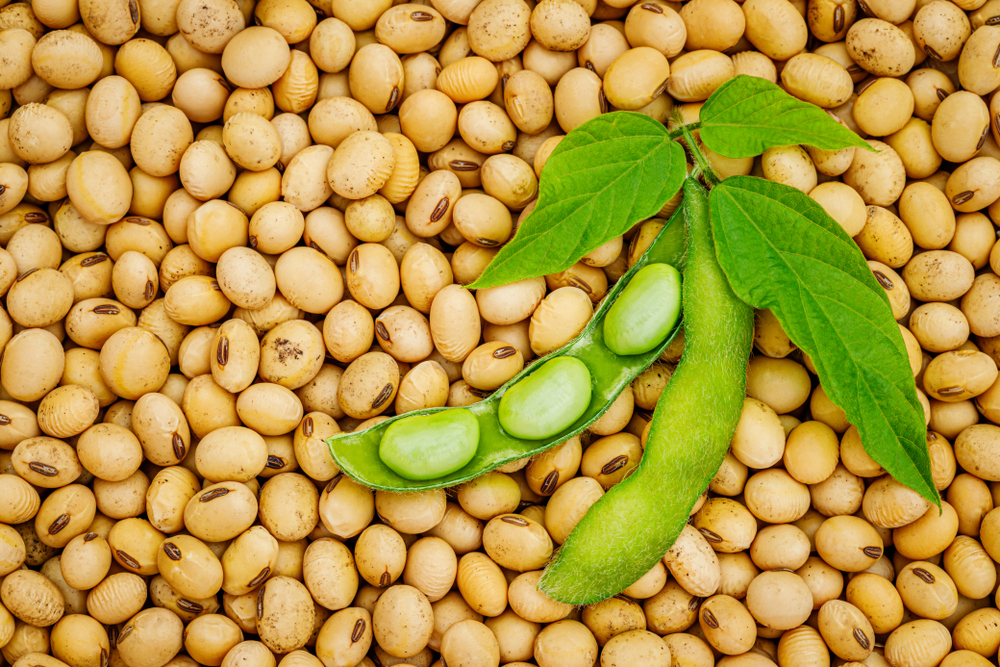Our society has undergone a slight paradigm shift lately. Were are becoming way more health-conscious than we once were. Everyone is moving more toward a healthy lifestyle and the market has seemed to respond to it.
If you look on the shelves of any groceries store or supermarket you have tons of products that say, organic, 100% whole grains, low fat, etc.
Yet obesity is steadily rising the the United States…

By: Daniel Salazar
Could it be all the so-called healthy food that we now ingest?! Could some of this food cause us to not only gain weight but severely damage our health?! I know these seem like dumb questions but what else could it be! In this article we are going to take a look at one food, in particular, SOY.
TRUE STORY
One day my mom comes home and tells me that a good friend of hers got very sick and needed to be rushed to the hospital. I asked what was the matter with her, she didn’t know and the doctors in the ER didn’t have the slightest clue, they let her stay overnight and sent her home the following day when she felt a little better.
You see Michelle was always a very health conscience woman. She worked out 4 times a week, was always buying organic foods, and was very conscious about what she ate. It was kind of a shock that she would get as sick as she did all of a sudden.
My mom went with Michelle to the doctor’s office that following day to find out what was the matter with her and they also didn’t have any idea what was going on. She had just gotten her annual check-up a few months before becoming ill.
Blood work blood, blood pressure, weight, and body fat all seemed just fine. The doctors took another blood test just to see if they could find anything and sent her on her way.
I was in my mom’s house when they got back from the doctor’s office. I asked what they said she said “nothing really” that they took some blood and said they would get back to her.
While my mom and deb were talking I overheard the conversation that they were having. Deborah was saying how it was ironic just when she starts her new healthy diet to get her summer body back she gets sick. My mom then says “you would be the one to get sick trying to eat healthily”, then they both start laughing.
A few weeks later the doctors concluded that her new soy-based diet was the main cause of her sudden illness. Deborah was diagnosed with Hypothyroidism. A condition which caused her to feel fatigued, and depressed, she also had difficulty concentrating, felt cold out of nowhere, started to lose her hair, altered her menstrual cycle, and gained a tremendous amount of weight.
After seeing firsthand the effects of this seemingly healthy food and countless hours of research on the topic of soy-based diets there are a few things I feel obligated to share with you.
In this 2 part article, I’ll give you a few reasons why you need to eliminate soy from your diet NOW.
THE SO CALLED “BENEFITS” OF SOY
The Food and Drug Administration (FDA) suggests that 25 grams of soy protein per day along with a diet that is low in saturated fat and cholesterol may help reduce the risk of heart disease as well as build muscle and help maintain lean body mass. They also claim that isoflavones, one of the active components in soy can help in protecting against breast cancer, prostate cancer, and osteoporosis. (3)
These results were based on a study done by the American heart association in 2006.
Also, an earlier study done by researchers Erdman & Potter in 1993 reported in the American Journal of Clinical Nutrition a 12 percent drop in cholesterol when 20 to 25 grams of soy protein and fiber were included in the diet. (4) Doesn’t that sound like superfood?
WHY THE LIES?
Well, first we have to keep in mind that most if not all the research of these benefits of soy were funded the soy manufactures themselves. I do not have hard evidence of this however in 1999, Archer Daniel Midland Corp (the worlds main producer of soy) put forth an application for a GRAS status and was declined due to the failure to reveal health risks of isoflavones on the American public. Which is what all foods the us Americans ingest are required to have to pass government standards.
NOTE: Generally recognized as safe (GRAS) is an American Food and Drug Administration (FDA) designation that a chemical or substance added to food is considered safe by experts, and so is exempted from the usual Federal Food, Drug, and Cosmetic Act (FFDCA) food additive tolerance requirements.
In a interview done by soy on-line services with a representative of Protein Technologies an affiliate of Archer Daniels Midland when they questioned the safety of soy, the representative told the interviewer that they had:
- “…teams of lawyer to crush dissenters, could buy scientists to give evidence, owned television channels and newspapers, could divert medical schools and could even influence governments
Let’s be real… who actually benefits from the lies that soy is a health food? The manufacturers!!
I would like to leave you all with this fact:
The United States is currently is one of the top producers of soy and soy based products. In 1980 sales of soy were at $300 million, in 1996 sales went up to $1 billion, in 2009 sales skyrocketed to $4.5 billion.(5) In the latest soy news by Global Industry Analysts, the global soy foods market will reach $42.3 billion dollars by 2015. (6)
The manufactures definitely want a piece of the action! With their cleaver marketing they have made us all believe that soy is in fact the wonder food.
REFERENCES
(1)Flegal KM, Carroll MD, Ogden CL, Johnson CL. Prevalence and trends in obesity among US adults: 1999-2000. Journal of the American Medical Association 2002; 288: 1723-1727.
(2) Hampl R, et. al. “Short-term effect of soy consumption on thyroid hormone levels and correlation with phytoestrogen level in healthy subjects.” Endocrine Regulation. 2008 Jun;42(2-3):53-61.
(2) Milerová J, et. al. “Actual levels of soy phytoestrogens correlate with thyroid laboratory parameters.” Clin Chem Lab Med. 2006;44(2):171-4.
(3) Sacks, F., et al. 2006. Soy protein, isoflavones, and cardiovascular health. An American Heart Association Science Advisory for professionals from the Nutrition Committee. Circulation. Published online before print, 01.17.06.
(4) Sandra R Teixeira, Susan M Potter, Ronald Weigel, Sandra Hannum, John W Erdman, Jr, and Clare M Hasler
(4) Effects of feeding 4 levels of soy protein for 3 and 6 wk on blood lipids andapolipoproteins in moderately hypercholesterolemic men
Am J Clin Nutr May 2000 71: 1077-1084
(5) Soya-tech, Inc. Soy foods: the us market 2010
(6) GIA. “Global soy foods market”, PR web, Jan 10 2011, PR web




